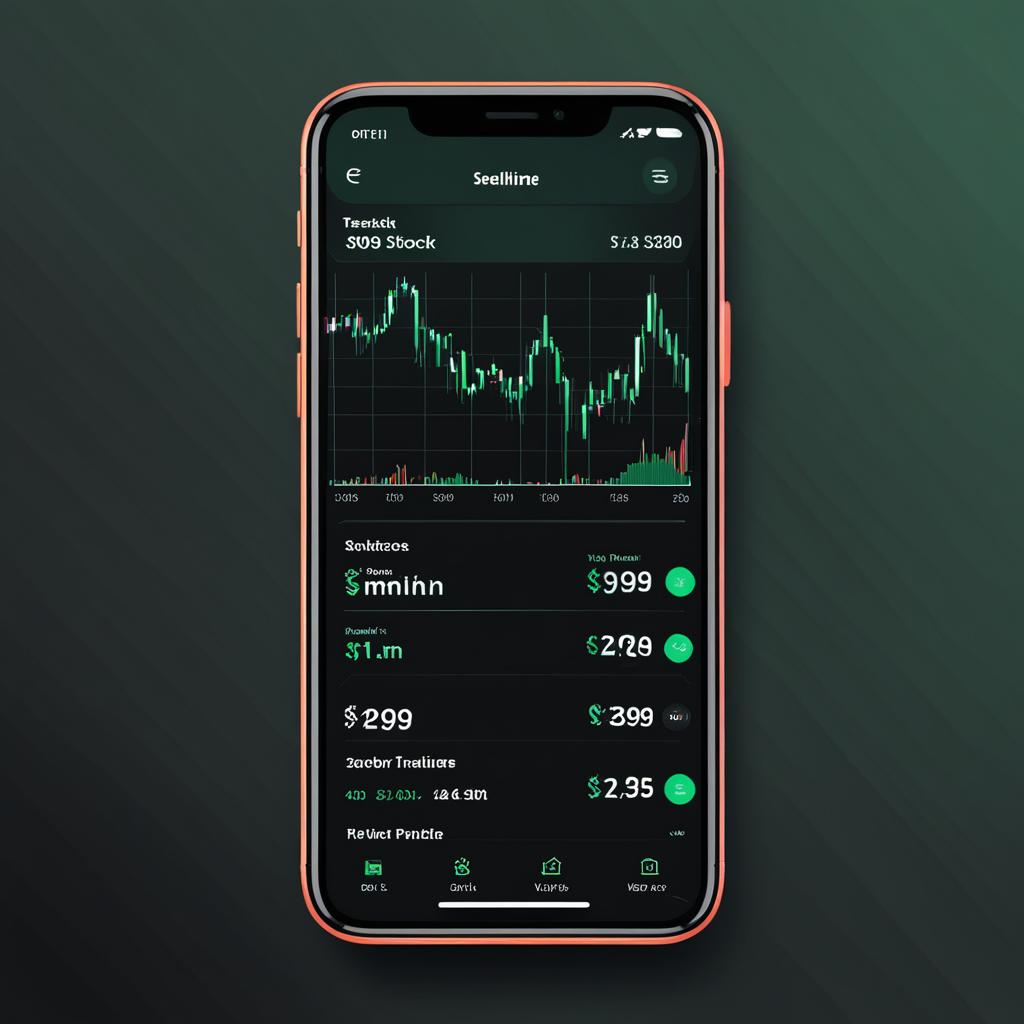Welcome to my comprehensive Robinhood Review! In this article, I will provide you with an in-depth analysis of the Robinhood trading platform, exploring its features, limitations, fees, and more. Whether you’re a new investor or an experienced trader, this review will help you determine if Robinhood is the right choice for your investment needs.
Robinhood has gained significant attention in the financial industry for its user-friendly interface and commission-free trading model. This platform aims to democratize investing by removing barriers such as high fees and complex interfaces. However, it’s essential to weigh the potential risks and limitations alongside the benefits.
If you’re interested in learning more about the Robinhood app, the trading platform, or the stock broker, you’ve come to the right place. Keep reading to discover everything you need to know before making a decision. But first, let’s explore some key takeaways from this review:
Key Takeaways:
- Robinhood offers a commission-free trading experience.
- The platform is designed to simplify stock trading and investing.
- Beginner investors may find the lack of educational resources concerning.
- Active traders might appreciate the basic features and low fees.
- Robinhood has faced controversies and regulatory fines.
Now, let’s dive into the details of what Robinhood has to offer and whether it aligns with your investment goals.
Note: The image above provides a visual representation of the Robinhood platform.
Who Should Choose Robinhood?
When considering the decision to choose Robinhood as your investment platform, it’s important to weigh the platform’s features and benefits. While Robinhood may be appealing to new investors due to its user-friendly interface and low fees, it is crucial to understand the platform’s pros and cons before making a decision.
Pros of Choosing Robinhood:
- Simple and easy-to-use platform
- Low fees and no commissions on stock and options trading
- Access to a range of investment options, including stocks, ETFs, options, and cryptocurrencies
Cons of Choosing Robinhood:
- Limited educational resources and research tools
- Involvement in major controversies
- Restricted cryptocurrency options
“While Robinhood may appeal to new investors, most experts recommend passive investing and low-cost index funds as a safer approach to growing wealth.”
It is important to note that while Robinhood’s simplified platform may be suitable for beginner investors, it may lack the robust tools and resources necessary for intermediate and advanced investors pursuing sophisticated trading strategies.
Table: Comparison of Robinhood Platform Features
| Features | Robinhood | Competitor A | Competitor B |
|---|---|---|---|
| User-Friendly Interface | Yes | Yes | Yes |
| Low Fees | Yes | Yes | No |
| Commission-Free Trading | Yes | No | No |
| Access to Cryptocurrencies | Yes | No | Yes |
| Educational Resources | No | Yes | Yes |
Robinhood Commissions and Fees
When it comes to commissions and fees, Robinhood has been a game-changer in the brokerage industry. In fact, it was the first major platform to eliminate commissions on stock and options trading. This move has attracted many new investors who appreciate the cost-saving benefits of using Robinhood for their investment needs.
However, it is important to note that while Robinhood offers commission-free trading, there are still certain features and services for which the platform charges fees. One example is Robinhood Gold, a premium subscription service that provides access to additional features such as lower interest rates on margin trading and research materials.
Another aspect of Robinhood’s fee structure is the controversial practice of payment for order flow. This means that Robinhood receives payment from market makers for routing orders to them. While this revenue model allows Robinhood to offer commission-free trading, some industry experts criticize it for potentially compromising order execution quality and transparency.
“While Robinhood’s commission-free trading is undoubtedly appealing, it’s important for investors to consider the potential trade-offs and fees associated with certain services. Conducting a thorough analysis of Robinhood’s fees will help investors make informed decisions and choose the investment options that align with their financial goals.”
To assist investors in evaluating the cost-benefit relationship of using Robinhood, I have compiled a table below that outlines the main fees and charges associated with the platform:
| Feature or Service | Fee |
|---|---|
| Stock and Options Trading | No commissions |
| Robinhood Gold | $5 per month (starting price) |
| Payment for Order Flow | Varies based on order routing |
Key Takeaways
- Robinhood was the first major brokerage platform to offer commission-free trading, attracting new investors with its low-cost opportunities.
- While stock and options trading on Robinhood are commission-free, the platform does charge fees for additional services like Robinhood Gold.
- Payment for order flow is a revenue model that some industry experts criticize due to potential impacts on order execution quality and transparency.
Understanding the fees and charges associated with Robinhood is crucial for investors considering the platform as their primary brokerage. By conducting a thorough analysis of the fees and evaluating the unique investment options available, investors can make informed decisions about whether Robinhood aligns with their needs and goals.
Robinhood Platform and Technology
The Robinhood trading platform is designed with simplicity in mind, providing users with an intuitive experience for buying and selling stocks, ETFs, and cryptocurrencies. Its minimalistic interface makes it easy for users to navigate and execute trades efficiently.
However, it’s worth noting that the platform lacks some advanced features and tools that are offered by competing platforms. For example, Robinhood does not provide trading simulators or security screeners, which can be valuable for investors looking to analyze market trends and make informed decisions.
Despite these limitations, Robinhood does offer basic charting capabilities, allowing users to visualize price movements and identify patterns. This can be helpful for technical analysis and identifying potential entry or exit points for trades.
In addition, Robinhood provides access to news stories and videos about specific stocks, enabling users to stay up-to-date with the latest market developments and make informed investment decisions.
To get a better understanding of Robinhood’s platform and technology, here’s an overview:
| Platform Features | User Experience |
|---|---|
|
|
Robinhood Range of Offerings
When it comes to investment options, Robinhood provides a limited but diverse range of tradable assets. As a platform for investors, it offers the following options:
1. Stocks
Robinhood allows users to trade stocks of various companies, enabling investors to build a portfolio of their favorite publicly traded companies.
2. ETFs (Exchange Traded Funds)
Investors can also explore a selection of ETFs which provide exposure to a diversified basket of stocks, bonds, or other assets, allowing for a more targeted investment strategy.
3. Options
For those looking for more advanced trading strategies, Robinhood offers options trading, which enables investors to capitalize on market movements and hedge against potential risks.
4. Cryptocurrencies
Robinhood stands out in the industry for its offering of cryptocurrencies. While the number of supported coins is limited, it provides a convenient way for investors to access popular cryptocurrencies like Bitcoin, Ethereum, and more.
Take a look at the limited number list below for an overview of the investment options available on Robinhood:
- Stocks
- ETFs
- Options
- Cryptocurrencies
It’s important to note that Robinhood does not currently offer mutual funds or bonds. However, the platform compensates for this by providing users with additional features to enhance their investment experience.
By reinvesting dividends automatically, Robinhood offers investors an opportunity to potentially accelerate their portfolio growth. Moreover, the platform provides a spending account feature that allows users to manage their cash and take advantage of its benefits.

Despite the limited range of offerings, Robinhood allows investors to explore a variety of tradable assets from the convenience of their mobile devices.
Robinhood Research and Education
When it comes to research and education resources, Robinhood falls short in comparison to some of its competitors. While the platform does provide basic articles and a newsletter for investment news, it lacks comprehensive tools and resources for in-depth research and analysis.
Robinhood does not offer stock screeners or advanced research tools that can help investors make informed decisions about which stocks to buy or sell. Additionally, access to professional research reports and analysis is not available for free on the platform. These are significant limitations, especially for investors who heavily rely on research to guide their investment strategies.
However, it is important to note that Robinhood does offer some research and educational materials, which can be beneficial for beginners and casual investors. The basic articles and newsletter can help users stay informed about the latest market trends and news.
“Robinhood falls short in terms of research and analysis tools. Investors looking for more robust resources may need to seek out alternative platforms.”
Robinhood Gold Membership
For investors who require more advanced research capabilities, Robinhood Gold membership is available for a monthly fee. This subscription unlocks additional features, including access to professional research reports, Level II market data, and Morningstar Reports. While these features can enhance the research and analysis process, it is important to consider whether the added cost is worth the benefits.
Robinhood Customer Service and Security
When it comes to customer service, Robinhood offers support through text chat and phone. While the text chat feature allows for quick and convenient assistance, reaching direct phone support can sometimes be challenging.
Robinhood prioritizes the security of its users’ accounts. The platform incorporates measures such as password encryption and two-factor authentication to ensure that customer information remains protected.
However, it’s worth noting that Robinhood has faced criticism for its customer service. Some users have reported difficulties in accessing timely and reliable support. Additionally, the platform has been fined in the past for engaging in misleading and harmful customer practices, raising concerns about its commitment to customer satisfaction.
“While Robinhood provides support through text chat and phone, it has faced criticism for its customer service.” – Investor123
Robinhood Customer Service and Security Pros and Cons
Let’s take a closer look at the pros and cons of Robinhood’s customer service and security:
| Pros | Cons |
|---|---|
| Convenient text chat support | Difficulty reaching direct phone support |
| Account security measures (password encryption, two-factor authentication) | Previous fines for misleading and harmful customer practices |
While Robinhood boasts convenient text chat support and implements security measures to protect user accounts, the platform falls short in providing accessible phone support and has faced regulatory scrutiny for its treatment of customers.

The image above highlights the importance of prioritizing customer service and security to ensure a positive user experience.
About Robinhood
Robinhood was founded in 2013 and is headquartered in California. The company gained popularity for its commission-free trading model and has played a major role in the industry’s shift towards zero-commission trading. However, it has also faced controversies and regulatory fines that have impacted its reputation.
Is Robinhood Right For You?
When considering whether Robinhood is the right platform for you, it’s important to evaluate its features and user experience. While Robinhood may be suitable for intermediate or advanced investors, it may not be the best choice for beginners due to a lack of educational resources and previous controversies.
Robinhood is designed to cater to active traders, offering options trading and access to initial public offerings (IPOs). If you are an investor who prefers frequent trading and wants to explore various investment opportunities, Robinhood’s platform features may align with your needs.
However, if you are only starting your investment journey or require educational resources to enhance your knowledge, Robinhood’s limited educational materials may not be sufficient. It may be more beneficial to seek a platform that provides comprehensive educational resources and tools to support your growth as an investor.
In my experience, Robinhood’s platform is intuitive and user-friendly, making it easy to navigate and execute trades. However, it does lack advanced features offered by other platforms, such as trading simulators and security screeners.
To help you evaluate whether Robinhood is the right fit, let’s look at a comparison table of its platform features and user experience:
| Feature | Robinhood | Competitor A | Competitor B |
|---|---|---|---|
| Options Trading | Yes | Yes | Yes |
| Access to IPOs | Yes | No | No |
| Trading Simulators | No | Yes | Yes |
| Security Screeners | No | Yes | Yes |
As you can see, while Robinhood offers options trading and access to IPOs, it falls short when compared to competitors in terms of advanced features like trading simulators and security screeners. This may impact the user experience for those seeking more comprehensive tools.

Ultimately, the decision to choose Robinhood as your trading platform depends on your investment goals, risk tolerance, and level of trading experience. It is important to weigh the platform’s strengths and weaknesses against your specific needs to make an informed choice.
How We Reviewed Robinhood
When conducting our review of Robinhood, we carefully evaluated several key factors to provide a comprehensive analysis of the platform. Our assessment focused on the following aspects:
- Available Accounts and Investments: We explored the types of accounts offered by Robinhood, such as individual taxable accounts, IRAs, and margin accounts. We also considered the range of investment options available, including stocks, ETFs, options, and cryptocurrencies.
- Commissions and Fees: Our review delved into the fee structure of Robinhood, including any charges for trades, account maintenance, or premium features.
- Ease of Platform Use: We assessed the user experience of the Robinhood platform, analyzing its interface, navigation, and overall usability.
- Features and Tools: We examined the tools and features provided by Robinhood, evaluating their usefulness for investors, including charting capabilities, news resources, and order types.
- Customer Service Availability: Our review considered the availability and quality of customer support options offered by Robinhood, including chat and phone support.
- Types of Investors Best Served: We analyzed the suitability of Robinhood for various types of investors, taking into account factors such as trading experience, investment goals, risk tolerance, and desired investment strategies.
- Company Reputation: We researched and analyzed the reputation and track record of Robinhood as a brokerage firm, considering factors such as regulatory fines, controversies, and user feedback.
- Special Features: Our review also examined any unique or standout features offered by Robinhood that contribute to its differentiation in the market.
By extensively evaluating these factors, we aim to provide a comprehensive and objective review of Robinhood that helps investors make informed decisions about using the platform.
Review Process
During our review process, we considered both the strengths and weaknesses of Robinhood, seeking to present an unbiased assessment of the platform. We conducted extensive research, analyzed available data, and leveraged our expertise in the brokerage industry to arrive at fair and transparent conclusions.
It is important to note that while our review offers valuable insights, individual experiences and preferences may vary. We recommend considering your own investment goals, risk tolerance, and desired features when choosing a brokerage platform.
Continue reading to learn more about where Robinhood shines and where it falls short.
Where Robinhood Shines
When it comes to what sets Robinhood apart, there are several standout features that make it a popular choice among investors. Let’s take a closer look at what makes Robinhood shine:
Low Costs and Commission-Free Trades
One of the biggest advantages of Robinhood is its low costs and commission-free trades. This means that investors can buy and sell stocks, ETFs, and cryptocurrencies without worrying about paying hefty fees. This can significantly impact an investor’s overall returns and make it more cost-effective to trade frequently.
Easy-to-Use Mobile App
Robinhood’s mobile app is designed with simplicity in mind. It offers a user-friendly interface that makes it easy for investors of all experience levels to navigate and place trades. Whether you’re a beginner or an experienced trader, the intuitive design of the app ensures a seamless and convenient investing experience.

Access to Cryptocurrencies
While many brokerage platforms offer traditional investment options, Robinhood stands out by providing access to cryptocurrencies. This gives investors the opportunity to diversify their portfolio and potentially benefit from the growing popularity of digital assets. With Robinhood, you can buy, sell, and hold popular cryptocurrencies such as Bitcoin, Ethereum, and Dogecoin.
Unique Features
In addition to its low costs and cryptocurrency offerings, Robinhood provides a range of unique features that enhance the investing experience. These include:
- Participation in Initial Public Offerings (IPOs): With Robinhood, you have the chance to invest in IPOs and potentially get in on the ground floor of exciting new companies.
- High-Interest Cash Option: Robinhood offers a high-interest cash management option, allowing investors to earn interest on their uninvested cash.
- Fractional Share Trading: Robinhood allows investors to buy fractional shares of stocks and ETFs. This makes it easier to invest in expensive stocks and diversify your portfolio.
- Debit Card with Cash Back Rewards: Robinhood offers a debit card that provides cash back rewards on purchases made with the card.
These unique features make Robinhood stand out from other brokerage platforms and provide investors with additional opportunities to grow their wealth.
Overall, Robinhood’s low costs, commission-free trades, easy-to-use mobile app, and access to cryptocurrencies make it an attractive choice for many investors. Additionally, the platform’s unique features add value and enhance the investing experience. However, it’s important to consider the full scope of Robinhood’s pros and cons before making a decision.
Where Robinhood Falls Short
While Robinhood offers a streamlined and cost-effective trading platform, it does have some limitations to consider:
- Lack of Mutual Funds and Bonds: Robinhood focuses primarily on individual stocks, ETFs, options, and cryptocurrencies. If you’re interested in investing in mutual funds or bonds, you’ll need to look elsewhere.
- Limited Customer Support: Robinhood provides customer support via text chat and phone, but direct phone support can be difficult to reach. If you prioritize extensive customer service, you may find Robinhood lacking.
- Encouragement of Active Trading and Margin Trading: While Robinhood’s simplified interface makes it easy to trade frequently, this can also promote impulsive decision-making and higher risks. Additionally, the availability of margin trading may attract inexperienced traders who could potentially incur significant losses.
- Payment for Order Flow: Robinhood receives payment from market makers for routing customer orders. Critics argue that this practice may not always result in the best execution for traders.
- Simplified Trading Interface: Robinhood’s minimalist design may be appealing to some users, but it lacks the advanced charting tools and features offered by other platforms. If you rely on extensive technical analysis, you may find the platform lacking.
- Lack of Advanced Research and Educational Resources: While Robinhood offers basic articles and a newsletter for investment news, it falls short in providing advanced research tools and educational resources. To access comprehensive research and analysis, you’d need to subscribe to Robinhood Gold, a paid membership.
“Robinhood’s limitations include the lack of mutual funds and bonds, limited customer support, encouragement of active trading and margin trading, the practice of payment for order flow, a simplified trading interface, and a lack of advanced research and educational resources.”
Pros and Cons of Robinhood
| Pros | Cons |
|---|---|
| Commission-free trading | Lack of mutual funds and bonds |
| User-friendly mobile app | Limited customer support |
| Access to cryptocurrencies | Encouragement of active trading and margin trading |
| IPO participation | Payment for order flow |
| High-interest cash option | Simplified trading interface |
| Fractional share trading | Lack of advanced research and educational resources |
| Debit card with cash back rewards |
While Robinhood offers several advantages, such as commission-free trading, an intuitive mobile app, and access to cryptocurrencies, it’s important to weigh these pros against the platform’s limitations.
What Robinhood is Best For
Robinhood is a trading platform that caters to the needs of different investors. Let’s explore the specific scenarios where Robinhood shines and the types of investors it best serves.
1. Mobile Users
If you prefer managing your investments on the go, Robinhood’s mobile app is a great fit. It offers a user-friendly experience, allowing you to trade stocks, ETFs, and cryptocurrencies with ease, right from your smartphone.
2. Individual Taxable Accounts and IRAs
Robinhood is well-suited for individual taxable accounts and Individual Retirement Accounts (IRAs). Whether you’re building your portfolio or saving for retirement, Robinhood provides a commission-free trading environment, helping you keep costs low.
3. Margin Accounts
For investors looking to utilize margin trading, Robinhood offers margin accounts. With a margin account, you can trade on borrowed funds, potentially amplifying your investment returns. However, please note that margin trading involves additional risks and is not recommended for all investors.
4. Active Trading
Robinhood is designed for investors who engage in active trading. The platform offers real-time market data, basic charting tools, and the ability to execute trades swiftly. If you’re an active trader who frequently buys and sells securities, Robinhood’s simplicity and efficiency can be advantageous.
5. Investors Comfortable with Limitations and Risks
It’s important to acknowledge that Robinhood has certain limitations. The platform lacks advanced features and educational resources found on other brokerage platforms. Additionally, as with any investment, there are inherent risks associated with trading securities. Therefore, Robinhood is best suited for investors who are comfortable with these limitations and potential risks.
While Robinhood caters to the needs of certain investors, it may not be ideal for everyone. Long-term, buy-and-hold investors or those who require extensive customer support and research resources may find other platforms more suitable for their investment journey.
I encourage you to assess your investment goals, risk tolerance, and preferences before deciding if Robinhood is the right fit for you.
Conclusion
In conclusion, Robinhood offers a simplified and low-cost trading platform that may be appealing to some investors. Its user-friendly interface and commission-free trades make it an attractive option for those looking to get started in investing. However, it is crucial to carefully consider the potential risks and limitations of the platform before making a decision.
Before choosing Robinhood as your brokerage, it is important to evaluate your own investment goals and preferences. If you are a beginner investor, it is essential to note that Robinhood lacks comprehensive educational resources and research tools that may be beneficial for your learning journey. Seeking advice from a financial professional can help you determine if Robinhood aligns with your investment needs and goals.
While Robinhood has unique features and appeals to active traders, it may not be suitable for long-term, buy-and-hold investors or those who require extensive customer support and research resources. It is necessary to weigh the advantages of low-cost trading and access to cryptocurrencies against the limitations and potential risks associated with the platform.
In summary, Robinhood can be a viable option for individuals seeking a simplified and cost-effective trading platform. However, it is crucial to conduct thorough research, understand your investment goals, and consider both the pros and cons before deciding if Robinhood is the right fit for you.
FAQ
Who should choose Robinhood?
Robinhood may be suitable for intermediate or advanced investors who are comfortable with the platform’s limitations and potential risks. It is not recommended for beginner investors, as it lacks educational resources and has been involved in controversies. The platform is best suited for active traders and offers options trading and access to IPOs.
What are the commissions and fees on Robinhood?
Robinhood was the first major brokerage platform to eliminate commissions on stock and options trading. However, the platform does charge for certain features such as Robinhood Gold, which offers lower interest rates and research materials. Robinhood also receives payment for order flow, which some industry experts criticize.
What is the platform and technology like on Robinhood?
The Robinhood trading platform is minimalistic and easy to use, with a focus on buying and selling stocks, ETFs, and cryptocurrencies. However, it lacks many advanced features and tools offered by competing platforms, such as trading simulators and security screeners. The platform does offer basic charting and access to news stories and videos about specific stocks.
What is the range of offerings on Robinhood?
Robinhood offers a limited range of tradable assets, including stocks, ETFs, options, and cryptocurrencies. It does not offer mutual funds or bonds. However, it does stand out for its cryptocurrency offerings, despite the limited number of supported coins. Robinhood also offers the ability to automatically reinvest dividends and has a spending account for cash management.
What research and education resources are available on Robinhood?
Robinhood lacks comprehensive research and education resources. While it does offer basic articles and a newsletter for investment news, it does not provide stock screeners, advanced research tools, or access to professional research for free. These features are only available to Robinhood Gold members, who must pay a subscription fee.
What is the customer service and security like on Robinhood?
Robinhood offers customer support through text chat and phone, although direct phone support can be difficult to reach. The platform has taken measures to ensure account security, including password encryption and two-factor authentication. However, it has faced criticism for its customer service and has been fined for misleading and harmful customer practices by regulatory bodies.
What is Robinhood all about?
Robinhood was founded in 2013 and is headquartered in California. The company gained popularity for its commission-free trading model and has played a major role in the industry’s shift towards zero-commission trading. However, it has also faced controversies and regulatory fines that have impacted its reputation.
Is Robinhood right for you?
Robinhood may be suitable for mobile users, individual taxable accounts and IRAs, and margin accounts. It is designed for active trading and appeals to investors who are comfortable with the platform’s limitations and potential risks. It may not be suitable for long-term, buy-and-hold investors or those who require extensive customer support and research resources.
How did you review Robinhood?
Our review of Robinhood is based on several factors, including available accounts and investments, commissions and fees, ease of platform use, features and tools offered, customer service availability, the types of investors best served by the platform, company reputation, and special features.
Where does Robinhood shine?
Robinhood stands out for its low costs, commission-free trades, easy-to-use mobile app, and access to cryptocurrencies. The platform also offers unique features such as IPO participation, high-interest cash option, fractional share trading, and a debit card with cash back rewards.
Where does Robinhood fall short?
Robinhood has limitations, including the lack of mutual funds and bonds, limited customer support, encouragement of active trading and margin trading, and the practice of payment for order flow. The platform also has a simplified trading interface and lacks advanced research and educational resources.
What is Robinhood best for?
Robinhood is best suited for mobile users, individual taxable accounts and IRAs, and margin accounts. It is designed for active trading and appeals to investors who are comfortable with the platform’s limitations and potential risks.
Our Friends
- https://time.com/personal-finance/article/robinhood-review/
- https://www.nerdwallet.com/reviews/investing/brokers/robinhood
- https://www.forbes.com/advisor/investing/robinhood-review/
Money posts:
 Public vs Robinhood: Which Investing App Is Best for You?
Public vs Robinhood: Which Investing App Is Best for You?
 Robinhood vs. Vanguard: Which is the Better Platform? (2024)
Robinhood vs. Vanguard: Which is the Better Platform? (2024)
 Is Robinhood Gold Worth It? (What $5 per Month Gets You) (2024)
Is Robinhood Gold Worth It? (What $5 per Month Gets You) (2024)
 Webull vs. Robinhood | What Sets Them Apart?
Webull vs. Robinhood | What Sets Them Apart?
 Robinhood vs. Acorns | Which Investing App Is Best?
Robinhood vs. Acorns | Which Investing App Is Best?
 Robinhood FREE Stock | Open A New Account and Get (2024)
Robinhood FREE Stock | Open A New Account and Get (2024)
 Acorns vs. Robinhood | Which Investing App is Best for You? (2024)
Acorns vs. Robinhood | Which Investing App is Best for You? (2024)
 M1 Finance vs. Robinhood: A Comprehensive Comparison of Two Popular Online Stock Brokers (2024)
M1 Finance vs. Robinhood: A Comprehensive Comparison of Two Popular Online Stock Brokers (2024)

